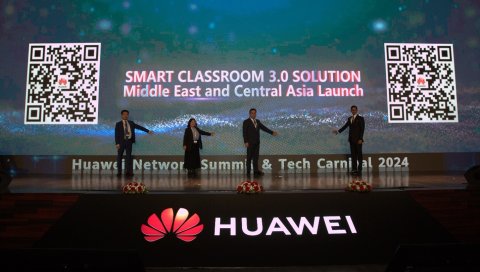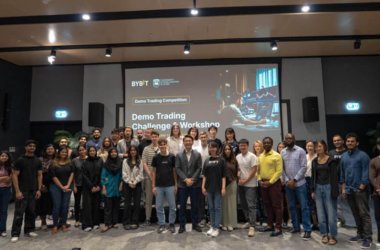
The rapid pace of technological advancements and the evolving needs of learners have paved the way for a new era in education.
This paradigm shift focuses on creating intelligent, adaptive, and personalised learning environments that empower students to thrive in the digital age. As the Middle East and Central Asia region embraces this transformation, it is crucial to explore the advantages and challenges in shaping the campus of the future.
Huawei Smart Classroom 3.0 is characterised by the seamless integration of technology into the learning process, enabling students to acquire knowledge and skills in a more engaging, interactive, and collaborative manner. By leveraging artificial intelligence (AI), the Internet of Things (IoT), and big data analytics, educational institutions can create smart campuses that optimise resources, enhance safety, and provide personalised learning experiences tailored to each student’s unique needs and abilities.
One of the key advantages of Huawei Smart Classroom 3.0 is the ability to foster a learner-centric approach. AI-powered adaptive learning systems can analyse students’ performance, learning styles, and preferences to deliver customised content and assessments. This not only enhances the learning experience but also allows educators to identify and address individual learning gaps more effectively. Furthermore, integrating immersive technologies such as virtual reality (VR) and augmented reality (AR) can provide students with hands-on, experiential learning opportunities, making complex concepts more accessible and engaging.
To harness the full potential of Smart Classroom 3.0, a multi-stakeholder approach is crucial. Governments play a vital role in developing policies and frameworks that prioritize digital education and allocate resources for infrastructure development. Educational institutions, on the other hand, must foster a culture of innovation and continuous improvement, investing in research and development to identify and implement best practices in technology-enhanced learning. Private sector partners, such as technology providers and education solutions providers, can contribute by developing cutting-edge solutions that cater to the specific needs of the region’s learners and educators.
In line with this vision, Huawei has developed the Smart Classroom 3.0 solution for the Middle East and Central Asia region, which was recently unveiled at Huawei Tech Carnival and Partner Summit 2024 in Baku, Azerbaijan. The solution fosters an interactive and intelligent teaching environment, allowing educators to explore innovative teaching methods. This advancement is set to drive the intelligent transformation of education, enhancing both teaching practices and student learning experiences.
Justin Sun Huan, Vice President, Enterprise Business Group, Huawei Middle East & Central Asia, stated, “Huawei’s smart classroom technology has shifted from purely digital to hybrid, resulting in Smart Classroom 3.0. This platform integrates AI and cloud computing to create a flexible and personalized teaching system while ensuring efficient and precise classroom management, offering a seamless end-to-end intelligence solution for teachers and students. Huawei, together with solution partners, will help customers build a robust digital infrastructure, develop smart classrooms, and digitise teaching processes. Our collective goal is to foster intelligent environments for scenario-based, experiential, and interactive teaching to elevate education and enhance research capabilities”.
Vusal Khanlarov, Head of the Education ICT Bureau, Azerbaijan Ministry of Science and Education, said, “As advanced ICT technologies continue to influence different areas of education, we see a shift from basic digitization to intelligent systems. Leveraging artificial intelligence, educators can tailor their teaching to be more personalized and differentiated, fostering the holistic development of students. We look forward to continuing our collaboration with Huawei to advance our digital transformation goals across the country”.
Huawei’s Smart Classroom 3.0 solution integrates AI and cloud computing to create a flexible and personalised teaching system while ensuring efficient and precise classroom management. Mehedi Hasan Limon, Vice President, Education and Healthcare, Enterprise Business Group, Huawei Middle East and Central Asia, explained, “Huawei’s Smart Classroom 3.0 employs AI-based educational models to intelligently analyse and extract key course content while generating knowledge graphs that allow teachers to tailor lesson planning and enable students to learn in a more individualized manner. The system evaluates teaching activities and classroom dynamics, facilitating effective analysis and feedback to improve education management”.
Christina Ng, General Manager, ULearning International, commented, “The Huawei Smart Classroom Solution 3.0 is designed for the education sector. We are pleased that Ulearning has partnered with Huawei to support customers in building a robust digital infrastructure, creating smart classrooms, and digitising teaching activities. Through this collaboration, we’re fostering intelligent environments that enable scenario-based, experiential, and interactive teaching methods. This approach aims to enhance educational outcomes and elevate research capabilities, advancing the overall quality of education”.
The integration of such solutions into the education landscape of the Middle East and Central Asia region exemplifies the progress being made towards Smart Classroom 3.0. By leveraging advanced technologies and collaborating with industry partners, educational institutions can create intelligent, adaptive, and personalised learning environments that cater to the diverse needs of learners.
As we navigate the path to Smart Classroom 3.0 , it is essential to keep the learner at the centre of all efforts. The ultimate goal is to empower students with the skills, knowledge, and mindset required to succeed in an increasingly digital and interconnected world. By embracing the opportunities and addressing the challenges associated with shaping the campus of the future, the Middle East and Central Asia region can unlock the full potential of its human capital and drive sustainable socioeconomic development.
Huawei is committed to continuously innovating solutions for the education industry, promoting the implementation of intelligent technologies in education, accelerating education intelligence, and enabling everyone access to high-quality and fair education. Huawei has served over 5000 education ministries, education management organisations at all levels, colleges and universities, and research institutes across more than 120 countries and regions, helping them realize intelligence in education.
Image Credit: Huawei





